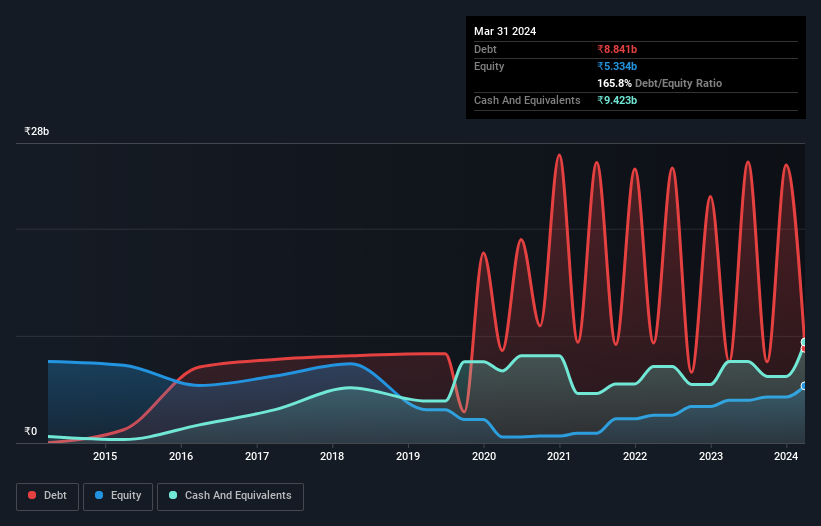- India
- /
- Hospitality
- /
- NSEI:MHRIL
Here's Why Mahindra Holidays & Resorts India (NSE:MHRIL) Has A Meaningful Debt Burden

Legendary fund manager Li Lu (who Charlie Munger backed) once said, 'The biggest investment risk is not the volatility of prices, but whether you will suffer a permanent loss of capital.' So it seems the smart money knows that debt - which is usually involved in bankruptcies - is a very important factor, when you assess how risky a company is. We note that Mahindra Holidays & Resorts India Limited (NSE:MHRIL) does have debt on its balance sheet. But is this debt a concern to shareholders?
When Is Debt A Problem?
Generally speaking, debt only becomes a real problem when a company can't easily pay it off, either by raising capital or with its own cash flow. Part and parcel of capitalism is the process of 'creative destruction' where failed businesses are mercilessly liquidated by their bankers. However, a more common (but still painful) scenario is that it has to raise new equity capital at a low price, thus permanently diluting shareholders. Of course, plenty of companies use debt to fund growth, without any negative consequences. When we examine debt levels, we first consider both cash and debt levels, together.
View our latest analysis for Mahindra Holidays & Resorts India
How Much Debt Does Mahindra Holidays & Resorts India Carry?
As you can see below, at the end of March 2024, Mahindra Holidays & Resorts India had ₹8.84b of debt, up from ₹7.56b a year ago. Click the image for more detail. However, it does have ₹9.42b in cash offsetting this, leading to net cash of ₹581.8m.

How Strong Is Mahindra Holidays & Resorts India's Balance Sheet?
According to the last reported balance sheet, Mahindra Holidays & Resorts India had liabilities of ₹25.0b due within 12 months, and liabilities of ₹68.1b due beyond 12 months. Offsetting this, it had ₹9.42b in cash and ₹11.0b in receivables that were due within 12 months. So it has liabilities totalling ₹72.7b more than its cash and near-term receivables, combined.
This deficit is considerable relative to its market capitalization of ₹81.1b, so it does suggest shareholders should keep an eye on Mahindra Holidays & Resorts India's use of debt. Should its lenders demand that it shore up the balance sheet, shareholders would likely face severe dilution. While it does have liabilities worth noting, Mahindra Holidays & Resorts India also has more cash than debt, so we're pretty confident it can manage its debt safely.
Unfortunately, Mahindra Holidays & Resorts India's EBIT flopped 13% over the last four quarters. If that sort of decline is not arrested, then the managing its debt will be harder than selling broccoli flavoured ice-cream for a premium. The balance sheet is clearly the area to focus on when you are analysing debt. But it is future earnings, more than anything, that will determine Mahindra Holidays & Resorts India's ability to maintain a healthy balance sheet going forward. So if you're focused on the future you can check out this free report showing analyst profit forecasts.
But our final consideration is also important, because a company cannot pay debt with paper profits; it needs cold hard cash. Mahindra Holidays & Resorts India may have net cash on the balance sheet, but it is still interesting to look at how well the business converts its earnings before interest and tax (EBIT) to free cash flow, because that will influence both its need for, and its capacity to manage debt. Happily for any shareholders, Mahindra Holidays & Resorts India actually produced more free cash flow than EBIT over the last three years. There's nothing better than incoming cash when it comes to staying in your lenders' good graces.
Summing Up
While Mahindra Holidays & Resorts India does have more liabilities than liquid assets, it also has net cash of ₹581.8m. And it impressed us with free cash flow of ₹2.9b, being 226% of its EBIT. So while Mahindra Holidays & Resorts India does not have a great balance sheet, it's certainly not too bad. In light of our reservations about the company's balance sheet, it seems sensible to check if insiders have been selling shares recently.
Of course, if you're the type of investor who prefers buying stocks without the burden of debt, then don't hesitate to discover our exclusive list of net cash growth stocks, today.
New: Manage All Your Stock Portfolios in One Place
We've created the ultimate portfolio companion for stock investors, and it's free.
• Connect an unlimited number of Portfolios and see your total in one currency
• Be alerted to new Warning Signs or Risks via email or mobile
• Track the Fair Value of your stocks
Have feedback on this article? Concerned about the content? Get in touch with us directly. Alternatively, email editorial-team (at) simplywallst.com.
This article by Simply Wall St is general in nature. We provide commentary based on historical data and analyst forecasts only using an unbiased methodology and our articles are not intended to be financial advice. It does not constitute a recommendation to buy or sell any stock, and does not take account of your objectives, or your financial situation. We aim to bring you long-term focused analysis driven by fundamental data. Note that our analysis may not factor in the latest price-sensitive company announcements or qualitative material. Simply Wall St has no position in any stocks mentioned.
About NSEI:MHRIL
Mahindra Holidays & Resorts India
Operates in the leisure hospitality sector.
Adequate balance sheet with moderate growth potential.
Market Insights
Community Narratives



